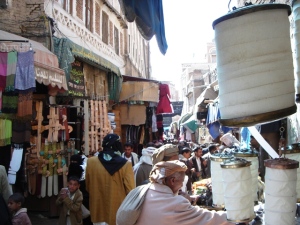The wedding party is more or less over by the time I arrive with my friend Um Jihad. She had to be late, because she’s still in mourning for her father who died two months ago, and the singing and clapping would be a violation of her mourning. So the singing and clapping are over, and only a few exhausted close family members are seated around Um Rafiq’s living room when we enter. The lady of the moment, Um Rafiq’s daughter Asya, has stepped out for a change of clothes and a freshening of hair and makeup, and everybody is enjoying the quiet moment with a cup of minty tea.
They are, of course, thrilled to see us, leaping up and shaking our hands profusely. Um Rafiq’s sister kisses me repeatedly. Finally we all settle down into our plastic chairs, staring at each other or nothing at all, and wait for Asya to reenter.
Finally Asya strolls in, eyes watering from an over-vigorous hair-brushing. She shakes my hand first and says, “Never get married; the hairspray will kill you.” She laughs uproariously as she sits beside me and crosses her legs under her black abaaya. The women in the room congratulate her on her gold and remark on the artistry of the henna applied to her hands. In fact, the henna is very simple and looks as though it were perhaps applied by a small child. It’s an arrow-pierced heart with R and A written inside it – Asya’s husband being named Rami.



